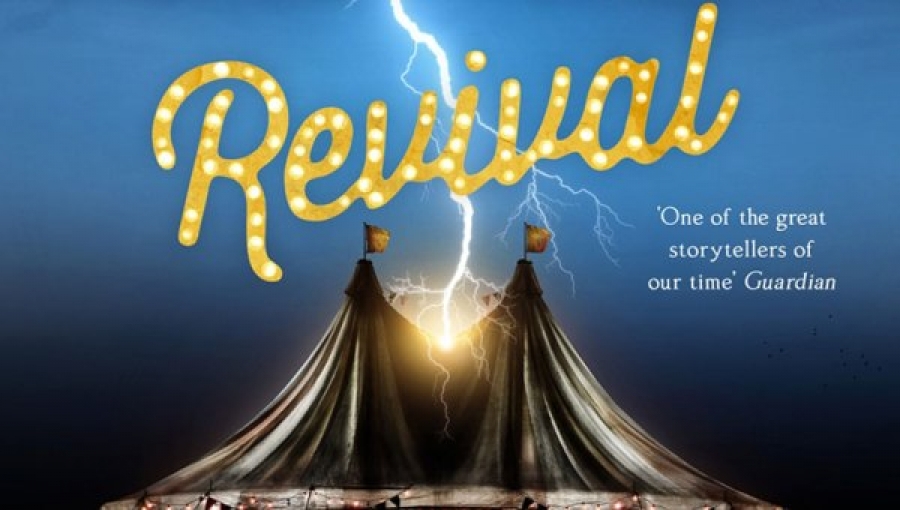I am a die-hard, life-long, can’t-get-enough-of-it Stephen King fan. The Stand and the Dark Tower series sit proudly in my list of all-time favorite books ever. He can’t write a book that’s too long for me, or with too many characters, or with too outrageous a plot. Even in my least favorite examples, I still always find some element worthy of turning the pages to the gritty end.
Revival plays easily into many of the things I love most about King’s writing. Slow-burn tension, hard-to-pin-down characters, and tough decisions complicated by universal human failings. In all of this, King once again succeeds in pulling me in and making me complicit with the moral implications of the story . . . this time by taking my natural curiosity to know how it’s all going to turn out and flipping it into a key plot question. “Be careful what you ask for” . . . this time, it’s true for King’s readers and main characters alike.
But, we should start at the beginning. Stephen King always takes me to my childhood in the most visceral ways possible. No, I didn’t grow up next to a burial ground full of pets or own a huge dog or winter with my family in a remote mountain lodge. Horror genre aside, King is a master of childhood sense memory. The time period he most typically depicts (his own), the late ’50s and ’60s, pre-dates me by a couple of decades, but because we had a similarly rural, lower-income upbringing, our experiences cross over quite a bit. I understand perfectly the daily cadences of that childhood and was naturally inclined to identify with his main character from the outset.
As Revival begins, we meet 6-year-old Jamie Morton playing with toy soldiers in the mud. Jamie, in turn, meets the new Methodist pastor, Charles Jacobs, and we immediately understand that this simple occurrence is going to have a life-long impact for both characters. Over the course of the following decades, their lives will intertwine sporadically but catastrophically, because this is Stephen King, after all. King spends considerable time setting these main characters up as likeable, though flawed, people. We have the nagging sense that Charles Jacobs is getting himself involved in something not too healthy, but by the time we’ve started to really get uncomfortable with his actions, we already have the same affection for him that Jamie does.
Both Jamie and Charles experience devastating losses that are the catalysts for their respective paths. Weighing this cause and effect is a vital part of generating a sense of sympathy (or lack thereof) for each man; however, in a somewhat uncharacteristic narrative choice, King chooses to reveal these events as second-hand, after-the-fact accounts. This muted the visceral reaction I think I would have had to a more direct telling, and, by extension, disconnected me somewhat from the motivations of the characters. This is a temporary weakness, however, that ultimately gets resolved as the characters step away from justifiable actions into (much) more questionable territory.
In the end, Jamie’s critical flaw is a lack of action. He allows stoppable events to unfold through selfish curiosity and a natural tendency to rationalize away possible dangers. “How bad could it be?” He believes he’s removed himself from direct responsibility only to discover just how integral to the events he’s always been. It is a universal trait, this denial of blame, that sits heavily with the reader as the story unfolds.
Once we clear the climax of the story, King takes us on an ambling journey back home that turns out to be even more troubling than the horror we have just survived. This denouement brings us back from the fantastic to an all-too-familiar reality and reminds us that there is no action without reaction. There will be consequences to even the most benign intentions, the most passive decisions. There are no innocent bystanders. Judgment may have been delayed, but it is inevitable.
You can’t really let go of a Stephen King story, because no matter how many monsters you rationalize away, you are left with the unexplainable and uncontrollable nature of chaos and evil in the world that we inhabit. What happens when you’ve lost faith in a benevolent purpose for humanity and are left with chaos as the center of your world view? What is the true nature of the seemingly random evil floating about? These are unsettling questions in any genre. They’re horrifyingly personal in King’s hands.
Audiobook Review
Narrated by David Morse
Simon & Schuster Audio
David Morse joins a group of wonderfully talented readers of Stephen King’s books, including Will Patton (Doctor Sleep, Mr. Mercedes), Grover Gardner (The Stand), George Guidall and Frank Muller (both of the Dark Tower series), among a host of other celebrity narrators.
Morse has a comforting, friendly, fatherly vocal quality that lulls you into a state of quiet coziness before dropping you into the nightmare. His character depiction was distinct, yet subtle. He achieves both female and elderly voices without descending into simpering falsettos or overdone caricatures. His quiet approach to the horror in the story served to heighten the tension and keep the events believable.
Morse’s performance was pitch perfect and entertaining. I found it to be a nearly flawless presentation of the tone of the book, allowing me to lose myself in the story while simultaneously keeping the author’s voice present in the narration. He’s a very welcome addition to the King audiobook family. I’d love to hear more from him.

